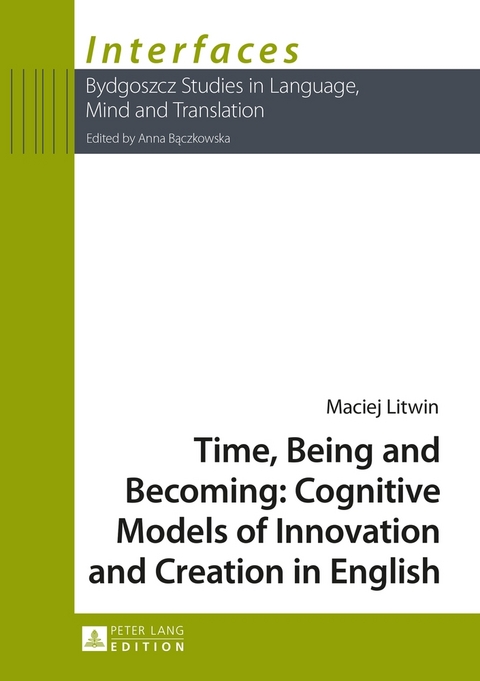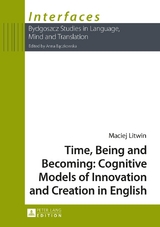Time, Being and Becoming: Cognitive Models of Innovation and Creation in English
2015
Peter Lang Gmbh, Internationaler Verlag Der Wissenschaften
978-3-631-65868-0 (ISBN)
Peter Lang Gmbh, Internationaler Verlag Der Wissenschaften
978-3-631-65868-0 (ISBN)
Cognitive linguistics offers tools to discuss philosophical problems of being and becoming (identity) as necessary or contingent. Major positions on these questions can be explained based on human counterfactual thought. Conceptualisations of «innovation» and «creation» in English (as instantiations of being and becoming) build on construal of time as actually experienced or figurative.
Cognitive linguistics provides tools to discuss identity as a process. Identity depends on the underlying conceptualisation of the present, while innovation and creation are borderline phenomena in epistemology. The two may be seen as generalised accounts of causation as a process: open-ended and closed, where time is conceptualised as real or figurative. Aristotle's epistemology builds on the conceptualisation of a subject manipulating objects in the visual field. Saint Augustine and Plotinus conceive of time and identity as real and contingent or figurative and necessary. William of Ockham builds on a simple conceptualisation of a time-point matrix as opposed to a duration matrix. British National Corpus findings relate to and comment on these expert philosophical conversations through the medium of cognitive models of "innovation" and "creation", instruments of thought and reason in English.
Cognitive linguistics provides tools to discuss identity as a process. Identity depends on the underlying conceptualisation of the present, while innovation and creation are borderline phenomena in epistemology. The two may be seen as generalised accounts of causation as a process: open-ended and closed, where time is conceptualised as real or figurative. Aristotle's epistemology builds on the conceptualisation of a subject manipulating objects in the visual field. Saint Augustine and Plotinus conceive of time and identity as real and contingent or figurative and necessary. William of Ockham builds on a simple conceptualisation of a time-point matrix as opposed to a duration matrix. British National Corpus findings relate to and comment on these expert philosophical conversations through the medium of cognitive models of "innovation" and "creation", instruments of thought and reason in English.
Maciej Litwin is an assistant professor of English (linguistics/translation studies) at the University of Wrocław. He previously worked as an executive for the City of Wrocław, Poland, where he developed key ingredients of the municipal innovation portfolio (2006–2014).
Contents: Substantive identity - Process identity - Conceptualisation of the present - Concept elaboration - Counterfactuals - Time-point matrix - Duration matrix - Cognitive Model of the Present - Contingency and neccesity in causality - Innovation - Creation.
| Erscheint lt. Verlag | 30.6.2015 |
|---|---|
| Reihe/Serie | Interfaces ; 6 |
| Verlagsort | Berlin |
| Sprache | englisch |
| Maße | 148 x 210 mm |
| Gewicht | 280 g |
| Themenwelt | Geisteswissenschaften ► Philosophie ► Sprachphilosophie |
| Geisteswissenschaften ► Sprach- / Literaturwissenschaft ► Sprachwissenschaft | |
| Schlagworte | Anna • Baczkowska • Becoming • Being • cogn • Cognitive • conceptualisation of time • Creation • English • Epistemology • Innovation • litwin • Maciej • Models • object identity • Ontology • Time |
| ISBN-10 | 3-631-65868-0 / 3631658680 |
| ISBN-13 | 978-3-631-65868-0 / 9783631658680 |
| Zustand | Neuware |
| Haben Sie eine Frage zum Produkt? |
Mehr entdecken
aus dem Bereich
aus dem Bereich
Macht und Legitimität politischer Sprache im Prozess der europäischen …
Buch | Softcover (2023)
Nomos (Verlag)
CHF 103,60
Wie die Menschheit zu ihrer größten Erfindung kam
Buch | Softcover (2022)
C.H.Beck (Verlag)
CHF 25,20




